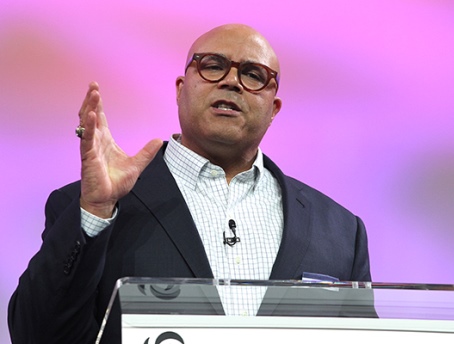NCTA's Powell: Split Net-Neutrality Ruling Could Destabilize Market
The smarter way to stay on top of the multichannel video marketplace. Sign up below.
You are now subscribed
Your newsletter sign-up was successful

The U.S. court of Appeals has still not come out with a ruling on ISP challenges, including from the National Cable & Telecommunications Association, to the FCC’s Open Internet order. Some court watchers say there is a good chance that it could disallow applying the new rules to wireless broadband, but leave them on wired. That could mean a different set of rules and expectations for wired and wireless, for wireless and WiFi, and for wireless or wired and edge providers.
In a recent interview session (see "Powell Pushes Back," subscription required), Multichannel News asked NCTA president Michael Powell how that bifurcated regulatory regime would affect his members.
MCN: If the FCC overturns the wireless portion of the Open Internet order, how does that impact the future of wired broadband if you are still under Title II?
Michael Powell: Let’s instead take the perspective of not what it does to us but what it does to the country and its policies. In a very, very sort of juggler-like way, the commission put together an almost Rube Goldberg set of choices. It overruled tons of existing communications precedents. It extended regulation to several sectors of the ecosystem that had never been regulated before. It tried to achieve massive forbearance in order to defuse the most onerous parts of the regime that IT was imposing, regulating portions of the network that have never been regulated before.
And what we were promised is that this thing would hold together in some kind of coherent, well-integrated regime that would be fair to all participants and somehow achieve the open network goal. OK. To me if that result takes place, the commission will try to crow that it won. I would argue that it loses if it loses any piece of this. It loses because you have now created a destabilized marketplace where different sets of rules apply for infrastructures providing the same or similar services.
Let’s go back to privacy. So, we’re going to have a world in which the privacy rules will be different for fixed broadband and wireless broadband, which would no longer be covered. And different for edge providers. That is three different privacy regimes for people who are all out there competing in the same services. That cannot be the direction people want to see. So, I think it is like a Jenga puzzle with pieces knocked out of the tower that we didn’t get the comprehensive thing that we were pledged, And I think you will distort and disadvantage markets.
Much has been said about how Verizon is seeming to be drifting away from the fixed market to the wireless market and the Web edge world by their own seeming admission. I think they are partly being moved that way because of this regulatory structure. We are losing a very effective fixed wire competitor who has found regulatory grass greener on the other side of the fence. I’m willing to say that if they get wireless outside of net neutrality, that will only hasten that migration.
The smarter way to stay on top of the multichannel video marketplace. Sign up below.
Is that better for consumers that FiOS and fixed product is less significant, less invested in and even going away? Businesses are funny animals, right. You can hurt them but you don’t generally kill them. Like a chameleon they re-grow an arm and they change color and they will go to where the action is optimal. If we make a regulatory mess of the classification of broadband, I think you will have all kinds of unintended consequences. I think it will become dramatically more wireless centric, even though the commission refuses to count wireless as a broadband substitute. The consumer does and the Pew surveys are showing that consumers are willing to use their wireless phones exclusively and not have any wireline product proves that, I think.
But the market won’t evolve because it is efficient or because of innovation of because market leadership took it that way. It is going to evolve as a remodel to avoid regulatory onus and find regulatory oxygen.
And that will be the doing of the architects of this system.
Contributing editor John Eggerton has been an editor and/or writer on media regulation, legislation and policy for over four decades, including covering the FCC, FTC, Congress, the major media trade associations, and the federal courts. In addition to Multichannel News and Broadcasting + Cable, his work has appeared in Radio World, TV Technology, TV Fax, This Week in Consumer Electronics, Variety and the Encyclopedia Britannica.

